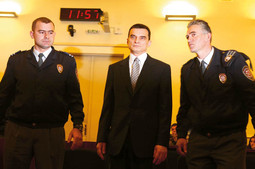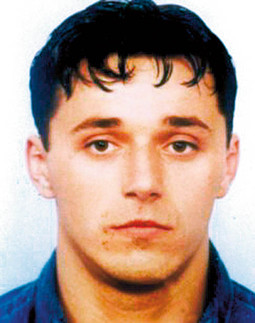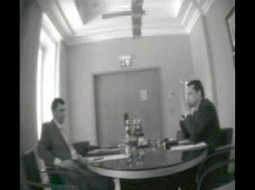SEVEN YEARS IN PRISON On Monday, 2 March, retired General Vladimir Zagorec was sentenced to seven years in prison for the theft of jewels worth 5 million dollarsThe State Attorney's Office has launched a new investigation into the dealings of retired General Vladimir Zagorec, Nacional has learned form legal professionals in the known – again this time on suspicions that he, along with the theft of the jewels he has been convicted for, also did away with other jewels, of a currently unknown value. The source of information on the theft of yet another quantity of jewels is Ico Matekovic, himself convicted to a seven year prison sentence for the kidnapping of Tomislav Zagorec, the then underage son of Vladimir Zagorec.
From his prison cell Ico Matekovic has offered the State Attorney's Office information on all of the dealings he and his brothers carried out for Vladimir Zagorec. Matekovic has stated that Zagorec asked him and his brothers to try to sell these other precious stones of a currently unknown value. What has been reconstructed so far is that these were not the same jewels that Vladimir Zagorec was convicted on Monday of having stolen and sentenced to seven years in prison. Ico Matekovic offered his insight into some other witnesses that could corroborate the authenticity of his story. The dossier of this case also contains photos of at least four small boxes full of precious gems that Matekovic has submitted to the State Attorney's Office. Legal sources in the know claim that the State Attorney's Office has leads as to where these jewels are, and some are even saying that Matekovic has made some of these precious stones available to the competent state institutions in an effort to provide additional credence to the credibility of his information.
At the State Attorney's Office they now suspect that Josef Rothaichner is not the only person that delivered jewels to Zagorec as security for money the state was giving to arms dealers to deliver arms to Croatia under the embargo. There are suspicions that this model of operation was used on several occasions, and that Zagorec used them to gain personal wealth.
And while Vladimir Zagorec has been convicted of seven years in prison for the misappropriation of the precious gems worth at least 5 million dollars, the State Attorney's Office will appeal the decision and seek the maximum penalty of ten years imprisonment.
At the State Attorney's Office they will continue to investigate the circumstances under which Vladimir Zagorec gained his wealth, and will be open to discussion if Zagorec decides to reveal all he knows about the theft of money earmarked for the Croatian defence effort.
During the legal wrangle surrounding his extradition to Croatia Zagorec on several occasions directly and via his attorney Zvonimir Hodak offered Chief State Attorney Mladen Bajic extensive documentation he says precisely and clearly proves that Luka Rajic, Ivan Cermak and Hrvoje Sarinic gained their wealth through illicit means. He has, however, not shown this documentation to date.
This "Precious Gems Part II" scandal is a step towards the broader elucidation of the shady dealings of the 1990s. It could open some other cases and investigations, and Zagorec may wind up getting even more years in prison. At the State Attorney's Office they believe that the first instance conviction of Vladimir Zagorec can also be considered a small step on the path to reconstructing of the suspicious dealings of the Hypo Alpe Adria bank, which for years provided lucrative credit lines to the businesses and operations in the shadows of whose ownership structure stood Vladimir Zagorec.
Because of Vladimir Zagorec's knowledge of these dealing the outcome of the proceedings against him in Zagreb were monitored with undisguised interest in Austria. Some political circles there to this day fear that Zagorec could begin openly cooperating with Croatian authorities and explain on the basis of what deposits the Hypo Alpe Adria bank loaned money for some lucrative construction projects in Croatia and who else, besides Zagorec and Ivic Pasalic, made lucrative profits and began building their career as investors on the basis of these mysterious deposits – allegedly solely on the basis of brilliant ideas. These fears exist in Austria because there would then be talk again of the Hypo Alpe Adria bank in an unfavourable light, as a bank that grew based on money that a small circle of Croatian political heavyweights from the 1990s transferred to secret accounts in Austria through which Croatia was armed.
Nacional has learned from well-informed Austrian sources that Austrian bankers feel that Vladimir Zagorec and Ivic Pasalic, because of the money they moved to the Hypo Alpe Adria bank, practically had the status of secret members of the bank's supervisory board.
When Austria, among the last of the countries within the EU to do so, did away with secret bank accounts, they discovered large sums of money on secret accounts that nobody touched and for which it is not known to whom they belong. Anybody wanting to gain access to this money now has to declare their identity, which had previously not been necessary. If they do not do so, the money goes to Austria. That is why they were both allegedly concerned about the outcome of the scandal concerning Zagorec's jewels, which at the time could also have affected Pasalic's preferential standing within the bank.
Austrian sources have confirmed for Nacional that Zagorec and Pasalic were in regular contact for practically the entire time that Zagorec was fighting to avoid extradition to Croatia. Zagorec allegedly took on Zvonimir Hodak as his attorney at Pasalic's suggestion. According to some Zagorec behaved in Austria in the way Ivic Pasalic suggested he should, and Hodak was the person who relayed Pasalic's messages.
Over the past few years it has been revealed as an evident fact that both Zagorec and Pasalic had excellent relations with the then leading figures at the Hypo Alpe Adria bank - Günther Striedinger and Wolfgang Kulterer. Both have been in trouble in Austria on account of their roles in the operations of the Hypo Alpe Adria bank. According to Nacional's sources in Austria, in March of 2007 the Austrian State Attorney's Office launched a money laundering investigation into the affairs of both Striedinger and Zagorec, but the investigation has failed to turn anything up to date. The case was opened after the Croatian State Attorney's Office sought the legal aid of its Austrian colleagues on suspicions of the misappropriation of money earmarked for the purchase of weaponry, and suspicions that Zagorec returned a part of that money to Croatia through business deals involving real estate, i.e. that he was laundering money through the Hypo Alpe Adria bank.
Nacional has learned from well-informed Austrian sources that their authorities have discovered as many as 77 secret bank accounts used to finance the trade of arms for the effort to arm Croatia. The same source states that it was revealed that Zagorec transferred about 450 million dollars to these accounts ICO MATEKOVIC, convicted of the kidnapping of Zagorec's son, has told the State Attorney's Office that Zagorec asked him to try and sell other precious stones, of a currently unknown valueduring the war in Croatia, and that quite a bit of money remained on these accounts after the war. Zagorec was one of the few people who had access to this money. In Austria they have information that Zagorec in fact used this money as a deposit for his construction projects in Croatia. In some of these projects, like the one on the island of Hvar, Striedinger was his partner.
Nacional has learned from well-informed Austrian sources that Striedinger told an Austrian parliamentary inquiry that he approved a 260 million euro line of credit for Zagorec's construction projects in Croatia. Striedinger justified his actions with the alleged value of Zagorec's projects. The parliamentary inquiry investigated the suspicious dealings of the Hypo Alpe Adria and Bawag banks at the same time as the legal wrangling surrounding Zagorec's attempts to evade extradition to Croatia.
Since, as a result of his shady activities, he had a lot of information that could hurt the reputations of Austrian banks, Vladimir Zagorec was from the moment he moved to Austria of interest to their police and secret service. Nacional has learned from well-informed Austrian sources that Zagorec was in touch at the time with Mario Keinz, a federal police officer in the department for the protection of the constitutional order and anti-terrorism.
They say that Kienz was responsible at the time for collecting information on perpetrators of war crimes in Croatia and in Bosnia & Herzegovina for the needs of the UN tribunal in The Hague. Keinz initially spoke to Zagorec about then fugitive Ante Gotovina, and the British secret service also got involved in these discussions at the time.
Well-informed Austrian sources say that Zagorec gave them information about the inner team of people responsible for Gotovina's security while at large and that he revealed the identity of the person that Zagorec gave money used to hide Gotovina. Zagorec used his contacts from that period to ask Keinz for help in 2006 when he was under fire from the Croatian press. Zagorec had already then started telling him that his security was in jeopardy.
Well-informed Austrian sources have confirmed for Nacional that it was to Keinz that Zagorec sold the story that Croatian President Stipe Mesic was blackmailing him after the request for his extradition to Croatia. To back up these claims he informed Keinz that Mesic's national security advisor Sasa Perkovic was coming to Vienna to meet him. The meeting was monitored by the Austrian police, which recorded it. Keinz is alleged to have suggested to Zagorec that the Radisson SAS hotel be the meeting place. He also approved Zagorec's own recording of the discussion with Perkovic.
After the Austrian secret service recorded the meeting between Zagorec and Sasa Perkovic, these were comments within the parliamentary inquiry that it should not have been recorded, as a foreign political official was involved. Some Austrian politicians feel that it was recorded in the frame of the monitoring of Zagorec and that that was covered by a court order. The dilemma then was as to whether it would be admissible in court.
Because of his complex position, and because of the massive internal turmoil in Austria stemming from the suspicious operations carried out by the Hypo Alpe Adria bank, Zagorec tried to mitigate his own situation through various manipulations, even going so far as trying to cut a deal with the Austrian authorities. At a time when it was believed that there would be a complete disclosure of the suspicious dealings of the Hypo Alpe Austria bank, Zagorec wanted to gain political asylum in Austria on the basis of what he knew.
At the time Zagorec's Vienna meeting with Sasa Perkovic was recorded, some Austrian sources believed that a deal had already been struck with Zagorec on his political asylum and that the release of the recording of the Zagorec-Perkovic meeting worked towards having Zagorec receive asylum. Others commented that Zagorec agreed to be a protected witness who would testify against Jörg Heider and four other people from the Hypo Alpe Adria bank.
Nacional has learned from well-informed Austrian sources that Austrian politicians were also very careful as pertains to their moves and communication related to Zagorec.
This was partly because the Austrian secret services put together information on Zagorec that treated him above all as a criminal and war profiteer. There are claims that the information even made its way to the desk of then Austrian Prime Minister Alfred Gusenbauer, who allegedly spoke in late April 2007 with Zagorec's attorney at the time, Lansky, with whom he was very close. During the meeting Gusenbauer is alleged to have asked Lansky to decide, because if he wished to continue to represent Zagorec as his attorney, Gusenbauer would strip him of his mandate as legal representative of the Social Democratic Party of Austria. It was not long after that Lansky quit as Zagorec's attorney.
A SECRET RECORDING of his discussion with Sasa Perkovic that Vladimir Zagorec recorded at the Radisson SAS hotel in ViennaIt was not just Zagorec whose every step the Austrian secret services were carefully tracking prior to his extradition to Croatia. Also under informal surveillance at the beginning of the affair was young investigating judge Christina Forster, who ruled on whether Zagorec would remain in Austrian police detention until his extradition. Well-informed Austrian sources have provided Nacional with information that Forster, during a private discussion, spoke about why she had ruled that Zagorec would have to post the highest possible bail of 1 million euro. When asked she allegedly responded saying that she did so after learning first hand that Zagorec's property, real estate and bank deposits amounted to 284 million euro. Which is why it is no wonder that the Zagorec's trial for the theft of jewels was followed with interest in Austria, which ended Monday with a ruling sentencing him to seven years in prison.
Some in Austria also see the move as a possible introduction into a much wider scandal, which was perhaps only temporarily brought under control after the German-based Bayerische Landesbank took over control of the Hypo Alpe Adria bank. Vladimir Zagorec could reopen the affair if he decides to speak out about what he himself took part in. Judging by the off-the-record forecasts from the State Attorney's Office, the real thriller in the efforts to reconstruct the embezzlement of money collected for the defence of Croatia is just beginning.
Emphasis on the letter to Pukanic
■ Vladimir Zagorec was expressionless as he listened to the reading of the first instance ruling. The judicial police brought him into the large hall of Zagreb County Court at 11:56. Judge Sinisa Plese read the ruling for fifteen minutes and gave its verbal rationale. Plese said that he believed the testimony of the witnesses who said at the trail that they had seen the precious stones and that they existed, these being Hrvoje Petrac, Snjezana Siprak and Terezija Barbaric. He also expounded on some other facts and circumstances that gave him further reason to believe this testimony, especially that given by Hrvoje Petrac.
■ He cited in particular a letter that Hrvoje Petrac sent from prison to Ivo Pukanic. The judge told Zagorec that the letter in the end served as evidence against him, even though it had been introduced as evidence by his defence counsel. Plese stated that in the letter to Pukanic Petrac had mentioned that he had read the article by Nacional reporter Berislav Jelincic about the boxes that had been found and that had contained Zagorec's jewels, and that Petrac had said in the letter that they were in fact the boxes he had received from Zagorec.
■ Since the letter was written for private use, judge Plese said in court that Petrac had no reason to lie in the letter. He also stated that Petrac had been convicted to a prison sentence in another case, and that it was evident from that that there was no earlier agreement to encourage Petrac to open proceedings against Vladimir Zagorec. In reading the ruling it was taken to be an aggravating circumstance against Zagorec that he was the most decorated Croatian general.







